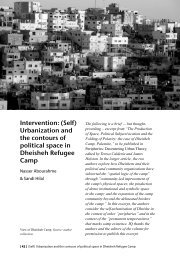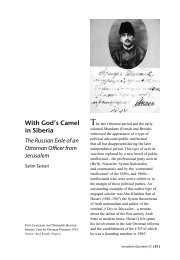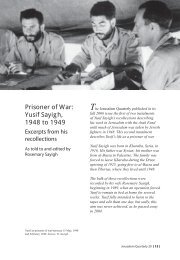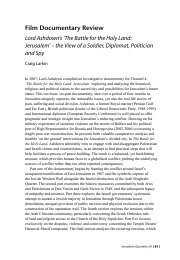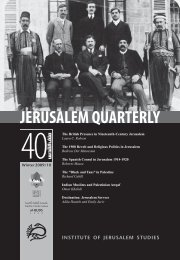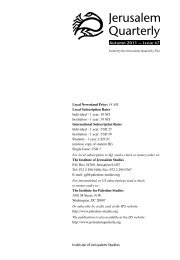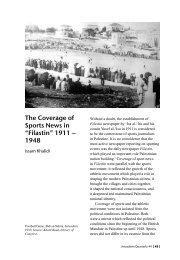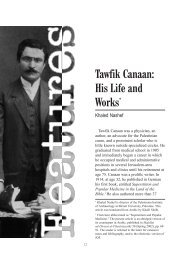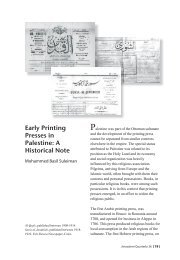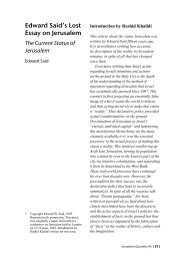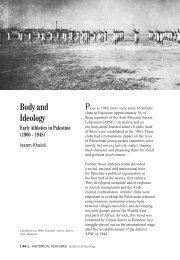Jurji Habib Hanania - Institute for Palestine Studies
Jurji Habib Hanania - Institute for Palestine Studies
Jurji Habib Hanania - Institute for Palestine Studies
Create successful ePaper yourself
Turn your PDF publications into a flip-book with our unique Google optimized e-Paper software.
Be<strong>for</strong>e buying his own press, <strong>Jurji</strong> <strong>Hanania</strong> started out by importing what he calls<br />
“<strong>for</strong>eign letters of the latest style and attractive design” (most probably French and<br />
Russian type) and using them to print material by renting facilities at presses owned<br />
by others in town. Such material was aimed at the tourists who flooded the city around<br />
Easter time every year, and so those attractively designed ‘letters’ were used <strong>for</strong> no<br />
more than three months each year. He then imported Arabic type but was careful to use<br />
it only at presses where the Arabic language was not known and the type would not be<br />
recognized as Arabic but mistaken <strong>for</strong> Turkish (which, in those days, was written in<br />
the Arabic script), thus circumventing a ban imposed by the government on printing<br />
material in Arabic without a special permit. This went on <strong>for</strong> about a year be<strong>for</strong>e the<br />
authorities tracked him down and almost brought a halt to all his printing activities.<br />
But he had been serving the government by printing various <strong>for</strong>ms and booklets <strong>for</strong><br />
use in its offices and, as luck would have it, he had just finished printing a book <strong>for</strong><br />
someone he describes as a “notable and influential” government official. This seems<br />
to have persuaded the authorities to take a more <strong>for</strong>giving view of his activities, and he<br />
was allowed to continue with his work in anticipation of an official permit, which was<br />
issued to him three years later, in 1898.<br />
In the years preceding the official permit, <strong>Jurji</strong> worked at other people’s presses during<br />
the day and at home in the evening. With permit in hand, however, he bought an old<br />
printing machine, moved his collection of type and other material to new premises<br />
and became an independent publisher. The first machine was a small foot-operated<br />
printer but, with the expectation of obtaining a permit to publish a newspaper, he soon<br />
imported a full-sized fuel-powered European-made printing press.<br />
There were difficulties. <strong>Jurji</strong> refers to this period in the Ottoman rule as the “age<br />
of despotism”, when there were hardly any rules of governance and people were<br />
subject to the whims and fancies of those in authority. The sultan, after 20 years of<br />
rule in which he saw his empire lose its grip on many of its provinces, had dismissed<br />
parliament and declared an absolute monarchy. This was later reversed when, in<br />
1908 following a popular revolt, parliament was restored and the empire again had a<br />
constitutional government. Until that time (i.e. until 1908), dealing with government<br />
officials was an exercise in frustration. The fact that one of the government offices,<br />
the Ministry of Education, had jurisdiction over all printing presses and kept close<br />
control over material that went into print added a new–and unwelcome–dimension to<br />
the publisher’s daily ef<strong>for</strong>ts. Another obstacle arose from the fact that, as of 1903, <strong>Jurji</strong><br />
<strong>Hanania</strong>’s press was asked to print the government’s weekly official gazette–in Arabic<br />
and Turkish–and that led to frequent unannounced visits by government officials to<br />
the premises, which in turn discouraged other writers from patronizing that press.<br />
Thus there were times when typesetters would work <strong>for</strong> two days to produce the<br />
official gazette and then sit idle until the next issue was brought to them the following<br />
week. Although he fully cooperated with the authorities, <strong>Jurji</strong> was also the victim of<br />
accusations about having “<strong>for</strong>eign inclinations”.<br />
[ 60 ] HISTORICAL FEATURES History of the Earliest Press in <strong>Palestine</strong>, 1908-1914



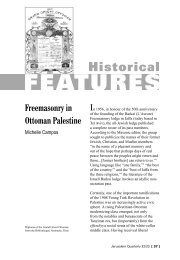
![In Search of Jerusalem Airport [pdf] - Jerusalem Quarterly](https://img.yumpu.com/49007736/1/180x260/in-search-of-jerusalem-airport-pdf-jerusalem-quarterly.jpg?quality=85)
